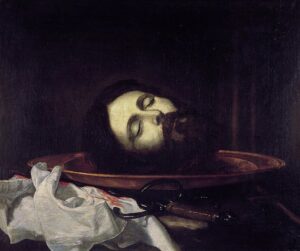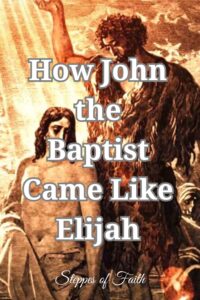
“He will also go before Him in the spirit and power of Elijah.” (Luke 1:17)
Before Gabriel told Mary she would give birth to the Messiah, another angel visited Zacharias with a similar message—he and his wife, Elizabeth, would give birth to a son named John. But he would not be any ordinary boy.
“For he will be great in the sight of the Lord and shall drink neither wine nor strong drink. He will also be filled with the Holy Spirit, even from his mother’s womb. And he will turn many of the children of Israel to the Lord their God. He will also go before Him in the spirit and power of Elijah to turn the hearts of the fathers to the children and the disobedient to the wisdom of the just, to make ready a people prepared for the Lord.” (Luke 1:15-17)
We know this man as John the Baptist. Matthew 2 describes that he wore camel’s hair and ate locusts and wild honey (v4). The Bible also tells us that he is the one “who was spoken of by the prophet Isaiah.”
“The voice of one crying in the wilderness. Prepare the way of the LORD; make straight in the desert a highway for our God.” (Is 40:3)
Isaiah was not the only one to announce John. The prophet Malachi, the last of the Old Testament minor prophets, also spoke of his coming.
“Behold, I will send My messenger, and he will prepare the way before Me.” (Mal 3:1)
Jesus Confirms John
In Malachi 3:1, the prophet uses wordplay on his name which means “the Lord’s messenger.” He prophesied that God would send a messenger to set the stage for the coming Messiah. The angel in Luke 1 says he would come in “the spirit and power of Elijah.” All three prophecies overwhelmingly point to John as that messenger, and he was the last one until Jesus’ arrival.
Jesus Himself also confirms that John is the prophesied messenger.
“But what did you go out to see? A prophet? Yes, I say to you, and more than a prophet. This is he of whom it is written: ‘Behold, I send My messenger before Your face, who will prepare Your way before You.’ For I say to you, among those born of women, there is not a greater prophet than John the Baptist.” (Luke 7:26-28)
“For all the prophets and the law prophesied until John. And if you are willing to receive it, he is Elijah, who is to come.” (Mt 11:13-14)
But before Jesus could confirm the messenger’s identity, many believed God would return Elijah to them, based on Malachi 4.
“Behold, I will send you Elijah the prophet before the coming of the great and dreadful day of the LORD. And he will turn the hearts of the fathers to the children and the hearts of the children to their fathers.” (Mal 4:5)
However, the angel in Luke 1 said the messenger would only come “in the spirit and power of Elijah,” which confuses many. The man described in Matthew 2:4 was not Elijah, so how did John come in Elijah’s spirit and power?

Was John Elijah?
Many Jewish people knew Elijah had not truly died (2 Kings 2:11). They expected that God would return him before the Messiah arrived, which is why they questioned if John was Elijah. Eventually, they realized he was not, and John himself denied the idea (John 1:21-23).
Nevertheless, the angel’s prophecy in Luke 1:17 said that John would go before Jesus “in the spirit and power of Elijah.” The phrasing indicates that it could have been anyone fulfilling that role. But God chose John because of his similarity to Elijah. He had the same type of ministry, the same power, and a similar personality (2 Kin 1:8; Mt 3:4).
John and Elijah also had other commonalities:
- They both wore a garment made of animal hair with a leather belt (2 Kin 1:8; Mt 3:4)
- They spent long periods in the wilderness (1 Kin 19:3-8; Mt 3:1)
- God called them to “prepare the way of the Lord (Mal 4:5; Mt 3:1; Mk 1; Lk 1:17)
- They preached repentance and reconciliation for sins (1 Kin 20-27; Lk 3:3)
- Both challenged the king for their wickedness (1 Kin 18:17-19; Mt 14:3-4)
- The king threatened them with execution because of the king’s wife (1 Kin 19:2; Mt 14:3; Mk 6:19)
However, one difference they had is in how they died—or not died.
John’s Imprisonment
Matthew 14, Mark 6, and Luke 9 describe King Herod Antipas imprisoning John for accusing him of unlawfully marrying his wife, Herodias.
“You shall not uncover the nakedness of your brother’s wife; it is your brother’s nakedness…It is wickedness.” (Lev 18:16,17)
Antipas only wanted to imprison John, but Herodias had far more evil intentions. She had already married her uncle, Philip, creating an incestuous relationship. Sometime later, Antipas, her other uncle, convinced her to leave his brother and marry him instead. She readily agreed, thus intensifying the incest in the family.
John was outraged at Herodias’ wicked decisions and selfishness, as well as Antipas’ lust for her. No ruler in Israel should openly and flagrantly violate God’s law. So John confronted Antipas, saying, “It is not lawful for you to have her (Mt 14:4). The Greek translation of this verse indicates that John repeatedly chastised Antipas for his sin, causing Antipas to feel conviction. But Herodias became irate.
An Unjust Death
Antipas could have executed John for the confrontation, but Antipas sent him to prison instead for three reasons. Some scholars believe he sent John to a prison on the northeast shore of the Dead Sea to protect him from Herodias. Secondly, he also spared John because he feared him, “knowing that he was a just and holy man (Mk 6:20).” Finally, and perhaps most of all, he rather liked the prophet.
“And when he heard him, he did many things and heard him gladly.” (Mk 6:20)
Antipas desired to save John, but Herodias’ cunning eventually won out.
A short time later, Herod celebrated his birthday by throwing a huge feast to which he invited “nobles, the high officers, and the chief men of Galilee (Mk 6:21).” It was an elaborate affair involving music, dancing, and endless amounts of wine. At some point during the feast, his young stepdaughter danced for him. Antipas was so pleased with her (and drunk) that he offered her whatever she wanted.
“Whatever you ask me, I will give it to you, up to half my kingdom.” (Mk 6:23)
Prompted by her mother, Herodias, she asked for John’s head on a platter. Antipas instantly regretted his offer and felt “exceedingly sorry” because of his oath to her. He also did not want to look weak in front of his guests, so he agreed to her request.
“Immediately, the king sent an executioner and commanded [John’s] head to be brought. And he went and beheaded him in prison, brought his head on a platter, and gave it to the girl, and the girl gave it to her mother.” (Mk 6:27-28)

Elijah’s Supernatural Death
John’s disciples went to Antipas to recover John’s body and give him a proper burial. Elijah, on the other hand, had a very different experience.
“Then it happened, as they continued on and talked, that suddenly a chariot of fire appeared with horses of fire and separated the two of them. And Elijah went up by a whirlwind into heaven.” (2 Kin 2:11)
The Bible often associates God’s power with certain weather elements, such as fire, wind, and storms (Ex 13:21; Job 38, 40:6-14; Ps 29:3-9; Is 19:1; Ezk 1:4). Chariots and horses were the most advanced weapons of warfare of its day, so the chariots and horses of fire represent God’s power of protection over Israel. Therefore, Elijah went to heaven in God’s immediate presence through a supernatural whirlwind (some scholars say storm; note it was not in the chariot).
For reasons He only knows, God desired to bring Elijah home without experiencing a human death. But that is not the end of Elijah. He later appeared to Peter, James, and John along with Moses and a transfigured Jesus on a mountainside in Matthew 17:1-7 and Luke 9:30-36.
Some scholars also suggest that the two witnesses in Revelation 11 are Elijah and Moses. It could also be Elijah and Enoch, since Genesis 5:24 uses the same verb to describe how God “took up” Enoch and Elijah “went up” in 1 Kings 2:11. They are the only two men the Bible records who did not experience bodily death, meaning we may yet see Elijah again.
It is understandable why many people in the first century believed John was an incarnated Elijah. He had a power similar to Elijah’s that allowed him to make way for Jesus’ introduction to the Jewish people and draw people to repentance. However, he only came in Elijah’s power and spirit. John was only Elijah-like.
Nevertheless, John’s effect on the world has resonated through time and sets a beautiful example for today’s believers. They should similarly “prepare the way of the Lord” and “make His paths straight” for His return by sharing the gospel wherever, however, and to whomever they can.
